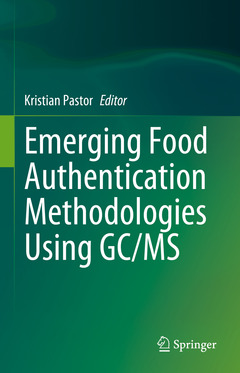Emerging Food Authentication Methodologies Using GC/MS, 1st ed. 2023

This edited book provides an overview of existing and emerging gas chromatography/mass spectrometry (GC/MS) based methods for the authentication and fraud detection in all major food groups and beverages.
Split in four parts, the book opens with a comprehensive introduction into the GC/MS technique and a summary of relevant statistical and mathematical models for data analysis. The main parts focus on the authentication of the main food groups (cereals, dairy products, fruit, meat, etc.) and beverages (e.g., coffee, tea, wine and beer). The chapters in these sections follow a distinct structure describing the nutritional value of the product, common fraud practices, economic implications and relevant biomarkers for the authentication process, such as volatile compounds, fatty acids, amino acids, isotope ratios etc. The final chapter provides an outlook on where the methodologies and the applications may be heading for.
Food fraud is serious problem that affects foodindustries of all kinds, which is why food authentication plays an increasingly important role. This book aims to serve as a knowledge base for all researchers in academia, regulatory laboratories and industry employing GC/MS for food analysis. Due to its comprehensive introduction and consistent structure, it can also serve as an excellent resource for students in food science, food technology, food chemistry and nutrition.
Part I. Introduction.- Chapter 1. Gas Chromatography and Mass Spectrometry: The Technique.- Chapter 2. Statistical and Mathematical Models in Food Authentication.- Part II. Authentication of Food.- Chapter 3. Cereals, Pseudocereals, Flour and Bakery Products.- Chapter 4. Edible Oils and Fats.- Chapter 5. Milk and Dairy Products.- Chapter 6. Meat, Eggs, Fish and Seafood.- Chapter 7. Honey and Bee Products.- Chapter 8. Fruits, Vegetables, Nuts and Fungi.- Chapter 9.- Herbs and Spices.- Part III. Authentication of Beverages.- Chapter 10. Fruit Juices.- Chapter 11. Coffee and Tea.- Chapter 12. Wine, Beer and Alcoholic Beverages.- Part IV. Outlook.- Chapter 13. Concluding Remarks and Future Perspectives.
Dr. Kristian Pastor is holding a PhD in food engineering, and currently serves as a senior research associate at the Department of Applied and Engineering Chemistry, Faculty of Technology, University of Novi Sad, Serbia. He is very passionate about food forensics and data science – developing methods for food authentication and fraud detection, employing novel data treatment tools, and studying proper human nutrition and health beneficial effects of various foods and beverages. The participation in seminars, trainings, projects and mobility programs in various cultural and professional surroundings such as Iran, Austria, Oman, Germany, Turkey, India, Greece, Morocco and others, significantly influenced his personal and professional development. Having a wide-ranging research interests, he worked in various fields including food analysis and technology, nutrition, environmental monitoring, bioenergy and biofuels, nanomaterials and nanotechnology, data science and applicative machinelearning.
Date de parution : 07-2023
Ouvrage de 353 p.
15.5x23.5 cm
